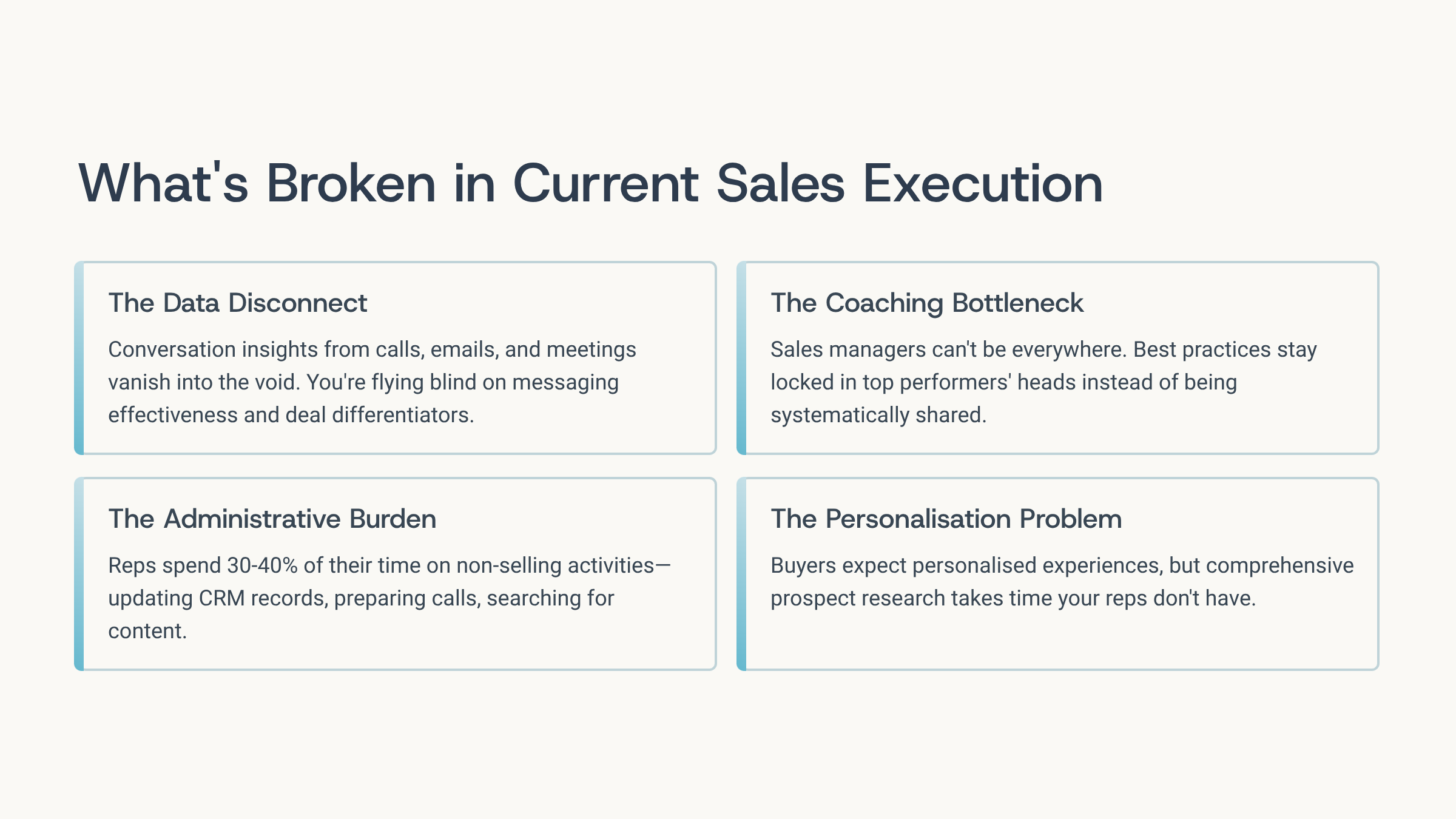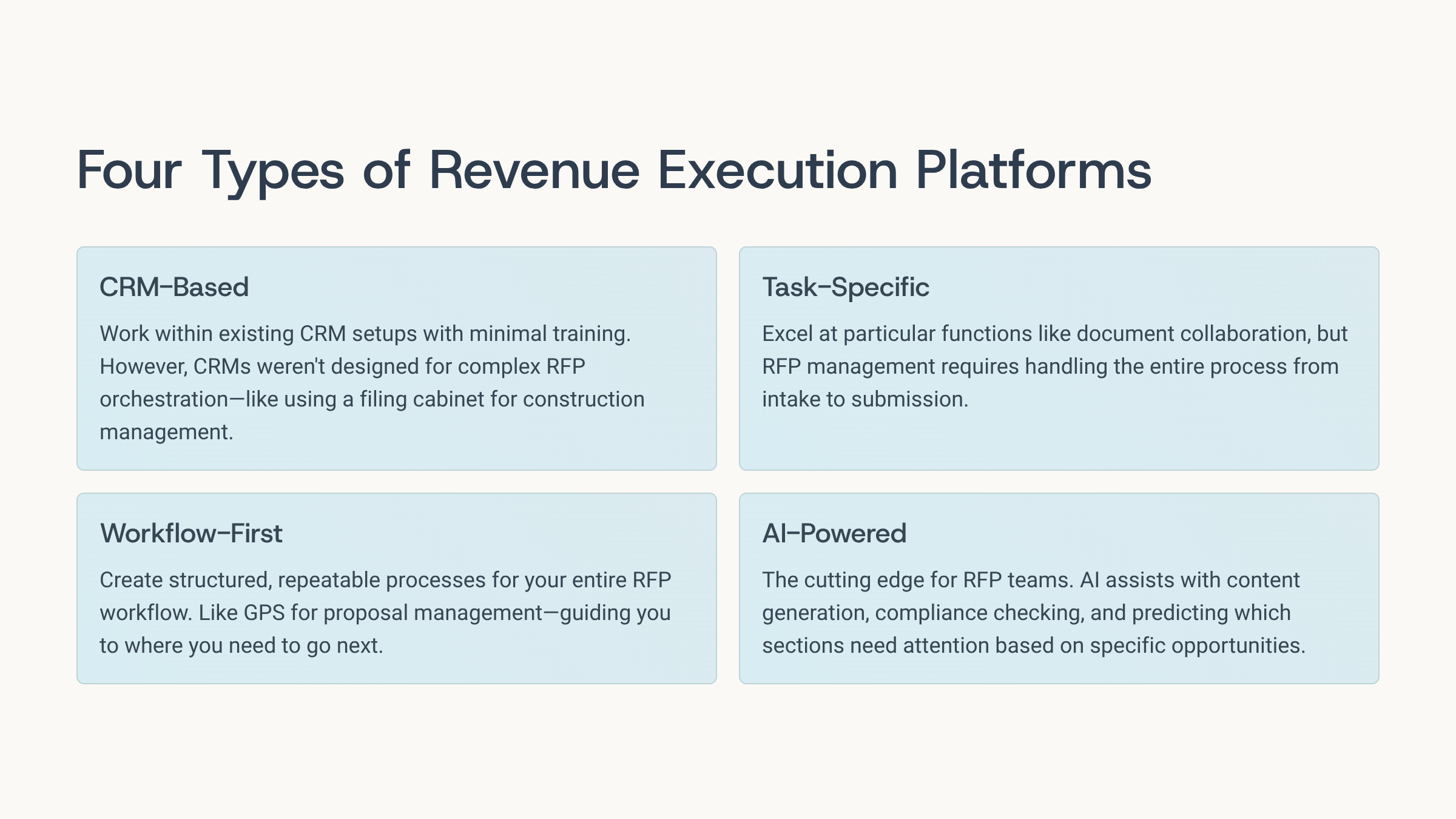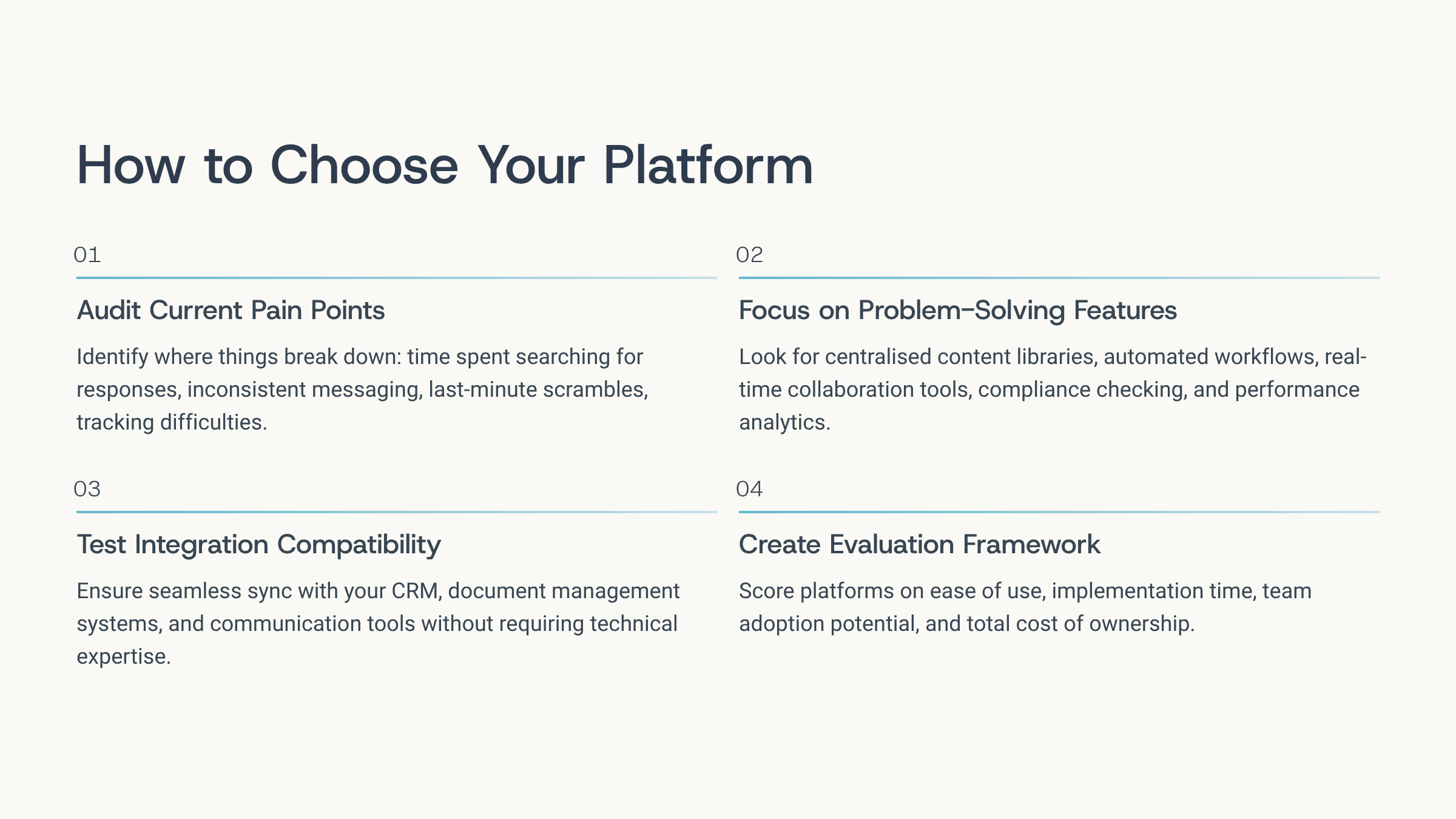Revenue Execution Platform: 101 Guide
Article written by
Kate Williams

INSIDE THE ARTICLE
SHARE THIS ARTICLE
Summary
Tired of the hype around "revenue execution platforms"? This blog clears the air. Learn what they actually are, how they differ from CRMs, and why sales teams are ditching dashboards in favor of execution-first tools that automate grunt work, align teams, and accelerate deals. Real talk, real use cases, and a no-fluff framework for choosing right.
How many hours did your team spend on RFPs last month?
If you're like most RFP managers, you probably winced a little. Between coordinating responses across departments, chasing down subject matter experts for their input, and trying to make sure your proposals actually sound coherent, you're probably logging more overtime than a tax accountant in April.
What if I told you there's a better way? Have you heard of Revenue Execution Platforms? It is the solution that's finally making RFP collaboration something you might actually enjoy. Let's see how.
What's a Revenue Execution Platform Anyway?
The revenue execution platform is the platform that connects your proposal writing to actual deal outcomes. It captures all those conversations with prospects, syncs everything with your existing tools, and creates what everyone talks about but rarely achieves—a single source of truth.
An interesting fact is the REPs use AI to spot patterns your sales team might miss. Which proposal sections convert best? What compliance language actually wins deals? Which team collaboration patterns lead to winning responses? It's like having a seasoned RFP manager analyzing every successful proposal and coaching your team in real time.
Challenges in Current Sales Execution
What's broken in most sales processes? Here are a few common pain points I have noticed in current sales execution across organizations:
The Data Disconnect
Your team generates tons of conversation data through calls, emails, and meetings. But most of it disappears into the void. Your CRM captures basic activity logs, but the actual insights from those conversations? Gone. You're flying blind on what messaging resonates, which objections come up most often, and what differentiates winning deals.
The Coaching Bottleneck
Sales managers can't be on every call. They rely on deal updates that may or may not reflect reality, and coaching happens after the fact—if it happens at all. Your best practices stay locked in your top performer's head instead of being systematically shared across the team.
The Manual Administrative Burden
Your reps spend 30-40% of their time on non-selling activities. Updating CRM records, preparing for calls, following up on action items, searching for relevant content—all time that could be spent actually selling.
The Personalization Problem
Buyers expect personalized experiences, but your team struggles to research prospects effectively at scale. Generic outreach gets ignored, but comprehensive research takes time your reps don't have.
More than being minor inefficiencies, these become systematic problems that compound into missed quotas, frustrated reps, and lost revenue opportunities.

Why Do You Need a Revenue Execution Platform?
The sales environment has fundamentally changed, but most execution approaches haven't kept up. Here are a few reasons why you need to make REPs a part of your sales process:
Buyers Are More Informed and Demanding
Your prospects research solutions extensively before engaging with sales. They expect conversations that acknowledge their specific situation and challenges. Generic pitches don't just fail—they actively hurt your credibility.
Sales Cycles Are More Complex
B2B purchases involve more stakeholders, longer evaluation periods, and higher scrutiny. Your team needs to navigate these complexities systematically, not hope their natural instincts carry them through.
Competition Is Fiercer
Your competitors aren't just other vendors—they're the status quo, internal priorities, and budget constraints. You need every advantage to stand out and create urgency.
Revenue Predictability Is Critical
Inconsistent sales execution creates unpredictable revenue. REPs standardize your best practices and make success repeatable across your entire team.
The Remote Reality
With distributed teams and virtual selling, traditional coaching and collaboration methods don't work. You need technology that enables consistent execution regardless of location.
Types of Revenue Execution Platforms
Not all platforms are built the same. Here are four different types of platforms that help you move the needle of your sales cycles:
1. CRM-Based
The CRM-based platforms will work within your existing CRM setup. Your team won't need extensive training, which is great. The downside? CRMs were designed to store customer data, not orchestrate complex RFP processes. It's like using a filing cabinet to manage a construction project - technically possible, but missing some important tools.
2. Task-Specific
These excel at specific functions like document collaboration or response tracking. They're great at what they do, but RFP management isn't just one task. You need something that handles the entire process from RFP intake to proposal submission to follow-up.
3. Workflow-First
Now we're talking. These platforms create structured, repeatable processes for your entire RFP workflow. They guide your team from initial RFP analysis through final submission. Think GPS for proposal management—they don't just show you where you are, they guide you to where you need to go next.
4. AI-Powered Revenue Execution
These represent the cutting-edge solution for RFP teams. AI helps with content generation, compliance checking, and even predicting which sections need more attention based on the specific opportunity. Companies using AI-powered platforms see around 6-10% more revenue at nearly half the operational cost.
For RFP teams specifically, AI-powered workflow-first platforms offer the best combination of process standardization and intelligent automation.

How to Choose Your Platform
You're probably thinking, "This sounds great, but how do I actually pick the right platform without getting fired when it doesn't work out?". Here is how you can choose the right platform for your team:
Step 1: Audit Your Current RFP Pain Points
Before you get excited about features, take an honest look at your current process. Where do things break down? Common trouble spots:
- Too much time spent searching for previous responses
- Inconsistent messaging across proposals
- Last-minute scrambles to meet deadlines
- Difficulty tracking which team members need to contribute what
- No clear way to measure what's working
Step 2: Focus on Features That Solve Real Problems
Look for capabilities that address your specific challenges:
- Centralized content libraries (so you stop reinventing the wheel)
- Automated workflow assignments (no more chasing people down)
- Real-time collaboration tools (goodbye, version control nightmares)
- Compliance checking (catch those requirements before submission)
- Performance analytics (finally understand what wins deals)
Step 3: Test Integration with Your Existing Tools
Your platform should enhance your current process, not force you to start over. The best REPs sync with your CRM, document management systems, and communication tools without requiring a computer science degree to set up.
Step 4: Create a Simple Evaluation Framework
Build a scoring system based on your priorities. Weight factors like ease of use, implementation time, team adoption potential, and total cost of ownership. The fanciest platform won't help if your team won't use it.
Reality check: Sometimes the platform with fewer bells and whistles but a better user experience wins in the long run.

What Actually Changes When You Implement a REP
Wondering what could be the real benefits of having a revenue execution platform rather than those marketing promises? Here are some realities you could expect from REPs:
Your RFP Team Actually Works as a Team
REPs eliminate the usual chaos of RFP collaboration. When everyone works from the same workflows and data, you stop playing telephone with proposal requirements. Teams with aligned processes see 67% better success rates and much less stress during crunch time.
You Can Actually Predict Outcomes
REPs help you forecast which RFPs are worth pursuing and which ones you should politely decline. Some platforms predict proposal success with 81% accuracy. No more spending weeks on long-shot opportunities.
You See What's Actually Working
REPs connect your proposal efforts to actual deal outcomes. Which compliance approaches work best? What technical content resonates with different buyer types? Which collaboration patterns lead to winning responses? You'll finally have data instead of gut feelings.
Your Team Gets Better Over Time
Instead of hoping best practices spread naturally, REPs systematize your winning approaches. The platform learns from successful proposals and guides future responses. Your team gets smarter with every RFP instead of reinventing the process each time.
Everything Connects
The most powerful benefit is that REPs create a central command center for your entire revenue process. Your RFP responses connect to sales conversations, customer success insights, and market intelligence. Teams implementing this approach typically save 20-30% of their time while winning more deals.
Conclusion
Implementing a revenue execution platform won't magically make RFPs fun. (Though it might make them considerably less painful.) What it will do is give your team the structured approach, intelligent automation, and collaborative workflows needed to consistently produce winning proposals without burning out your people.
The question isn't whether you need better RFP processes—it's whether you can afford to keep operating with scattered tools while your competitors leverage integrated platforms like SparrowGenie to submit better proposals faster.
Ready to see how AI can transform your RFP process?
Product Marketing Manager at SurveySparrow
A writer by heart, and a marketer by trade with a passion to excel! I strive by the motto "Something New, Everyday"
Frequently Asked Questions (FAQs)
Related Articles

Centralized RFP Content: One Team, One Truth, One Way to Win

7 Powerful Startup Insights from Microsoft’s 50-Year Journey
